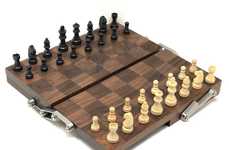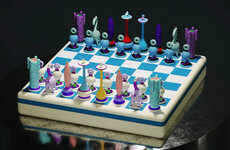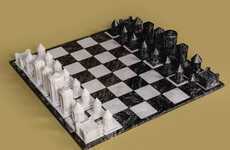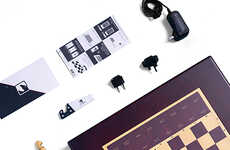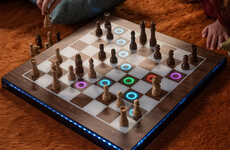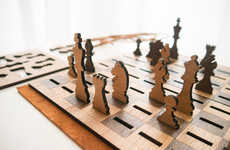
Democratic Chess Makes the Classic Strategy Game Fairer for the Pawns
Michael Hines — May 15, 2011 — Life-Stages
References: florianhauswirth.ch & dezeen
Seeing as how I couldn't even master a working knowledge of regular chess, I have no idea as to how I could ever understand Democratic Chess. Democratic Chess from Florian Hauswirth is a twist on the age-old game of strategy designed to make the game more democratic.
Although the rules haven't been fleshed out too much, Democratic Chess basically seems to be played like regular chess with the exception that captured pieces are not killed right away, but rather they are combined into one another to create stronger pieces. This makes the game more democratic, as the weaker pieces such as the pawns could now become the key piece in creating a super-strong new piece. As of now Democratic Chess is just another piece of modern art -- Hauswirth has no plans to develop it any further. It looks like pawns will continue to be pawns for a little while longer.
Although the rules haven't been fleshed out too much, Democratic Chess basically seems to be played like regular chess with the exception that captured pieces are not killed right away, but rather they are combined into one another to create stronger pieces. This makes the game more democratic, as the weaker pieces such as the pawns could now become the key piece in creating a super-strong new piece. As of now Democratic Chess is just another piece of modern art -- Hauswirth has no plans to develop it any further. It looks like pawns will continue to be pawns for a little while longer.
Trend Themes
1. Democratic Chess - Develop new strategies that incorporate democratic elements to make games fairer and more engaging.
2. Innovative Chess Sets - Create new chess sets that offer unique game modes and ways to play to attract a wider audience.
3. Gamification of Classic Games - Apply game design elements to classical games like chess to make them more appealing to younger audiences.
Industry Implications
1. Board Game Industry - Develop and market innovative chess sets and other board games with unique game modes and mechanics.
2. Educational Toys Industry - Use gamification techniques to create toys that teach children strategy, planning, and other valuable life skills.
3. Art and Design Industry - Create unique and visually stunning chess sets that attract collectors and chess enthusiasts alike.
0.8
Score
Popularity
Activity
Freshness

